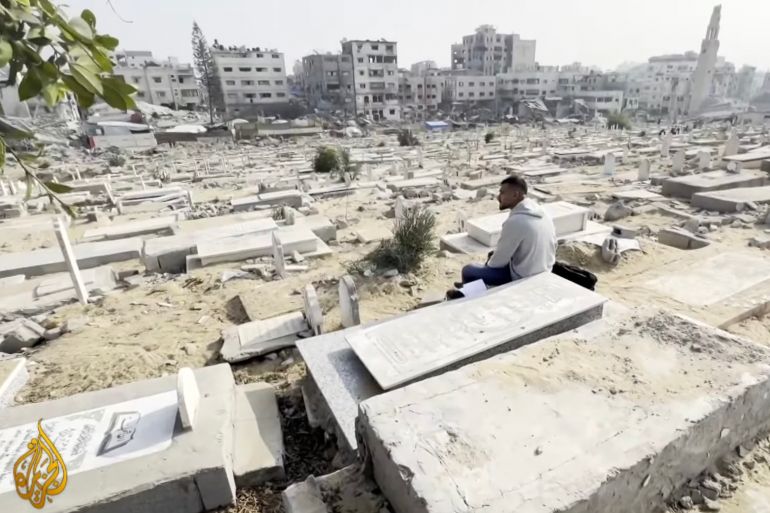Young man documents Gaza’s untold stories of Israel’s genocide in book
The 24-year-old says death and destruction make him question the purpose of writing, but he looks for a glimmer of hope.

Published On 22 Nov 202522 Nov 2025
Save
Amid the ongoing and unfathomable agony caused by Israel’s genocidal war in Gaza, a young displaced man is writing a book to express acute Palestinian suffering and tell human stories that would otherwise go unnoticed.
Wasim Said’s book, Witness to the Hellfire of Genocide, chronicles two years of unrelenting war, as well as repeated forced displacement as a result of the relentless Israeli bombardment, ground invasion, destruction and forced starvation.
Recommended Stories
list of 3 itemsend of list
The 24-year-old shared his story with Al Jazeera’s Hani Mahmoud, describing how he mostly writes inside a tent with nothing in it, including no real protection from the scorching heat in summer or the freezing winter cold and heavy rains.
“Displacement sites and tents have become part of our lives. We’ve had to find ways to adapt to this misery – even though it’s almost impossible,” he said.
Every chapter in Said’s book is named after a person, a place, or a memory he refuses to let disappear.
“I don’t need your sympathy,” he said. “I need a conscience that hasn’t rotted … a human that hasn’t turned to stone, I need a reader who won’t just close the book and sigh – then go to sip their coffee.”

He has spent many nights writing by candlelight because the Israeli military has destroyed nearly all of the infrastructure in Gaza, so there is no electricity or internet for the displaced population.
Said said he did not write for recognition, but to express his emotions and bear witness to the atrocities.
“I was devastated. I couldn’t contain my anger. Writing became the only way to let it out,” he said.
Advertisement
He began by writing about his experiences, but soon realised that there were many who had gone through even more horrific tragedies that he said the human mind cannot imagine.
“People who were killed and buried without anyone knowing. Their final moments. Their fear. I called this chapter The Untold Stories.”
For Said, every page is a form of quiet resistance against forgetting. He said death felt “inevitable” in many instances.
“I wrote because I wanted to leave something behind – to be a witness, not just another martyr. Stories disappear if they’re not documented,” he said.

With nearly 70,000 Palestinians killed by Israeli forces since October 2023 and countless hospitals, schools and homes lying in ruins, the young man said he has questioned the point of writing, or indeed the point of being alive.
“But human nature looks for a glimmer of hope. Even with the images of starvation and death, I still believe writing matters,” he said. “This is all I could write. The rest is being written now in blood. If I stay alive – I will finish the story.”


